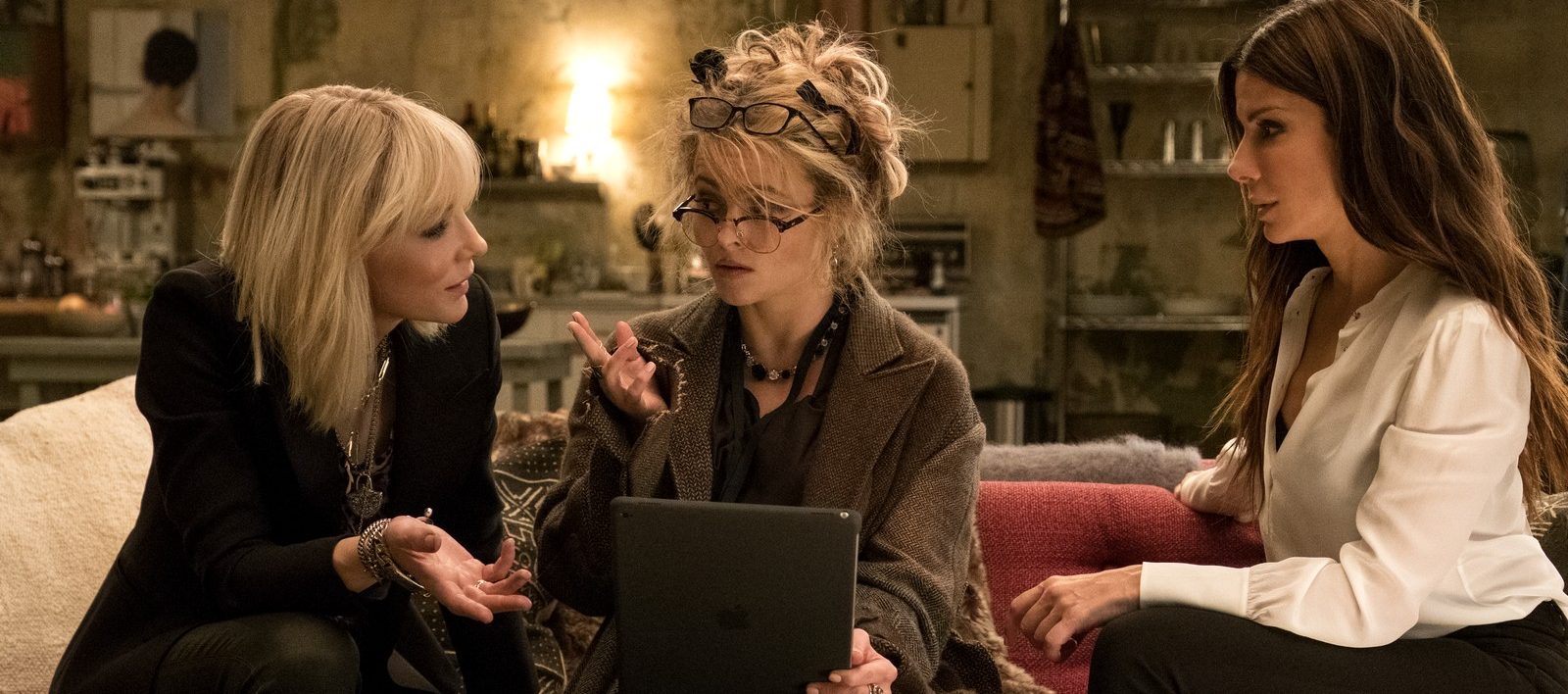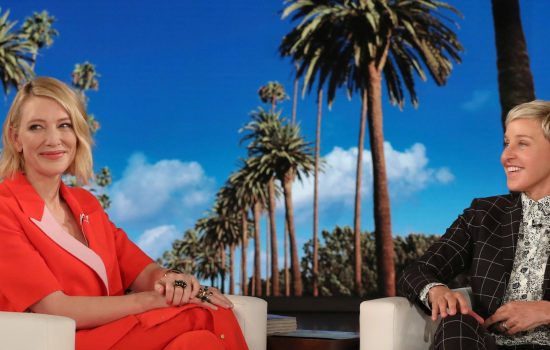Hello, everyone!
New article about The present from Vogue magazine. Enjoy the reading and the beautiful new photo!

Blanchett wears a Céline dress. Upton wears an A.P.C. overcoat, Prada pants, and a Burberry shirt and tie. Photographed by Anton Corbijn, Vogue, December 2016
Over the years, various playwrights, among them Michael Frayn and David Hare, have taken a crack at adapting Platonov, Anton Chekhov’s youthful and unwieldy first play—which, running some six hours long and featuring more than a dozen characters, went unproduced and unpublished in his lifetime. When Andrew Upton decided to try his hand at wrestling the sprawling work into a coherent evening of theater, though, he had a secret weapon: He would be tailoring it for two performers with whom he had already worked closely, one of whom happened to be perhaps the finest actress of her generation, not to mention Upton’s wife of nearly 20 years—Cate Blanchett. That production, titled The Present—a smash last year at the Sydney Theatre Company—arrives on Broadway this month under the direction of the Irish stage and screen director John Crowley (Brooklyn), with an extraordinary ensemble cast, giving New York audiences a chance to see Blanchett reunited with her Uncle Vanya costar Richard Roxburgh. “Obviously I know Cate very well,” Upton says with a laugh. “And knowing that I could write it around her and Richard—they’re so beautiful together and have such chemistry onstage—allowed me to find the energy in the play and cut right to the heart of it.”
Upton has taken the elements of the play that would become hallmarks of Chekhov’s more mature work—the bucolic setting, the mixture of comedy and tragedy, the befuddled characters ruing their lives—and brought them into the late twentieth century, setting the action at a dacha outside post-perestroika Moscow against the rise of the oligarchs. The fortieth birthday of Anna Petrovna (Blanchett), a no-longer-wealthy widow at a crossroads, brings together an assortment of hapless old admirers and menacing new suitors, plus assorted wives and children, for a combustible weekend in the country. Chief among them is Mikhail Platonov (Roxburgh), a womanizing schoolteacher bitter about the unfulfilled promise of his life, including the unconsummated passion between him and Anna, who still loves him but is in the market for a rich husband. For Blanchett—whose past stage triumphs include such unhinged heroines as Hedda in Hedda Gabler, Blanche in A Streetcar Named Desire, and Yelena in Uncle Vanya—the moody, quixotic Anna is just the kind of challenge she relishes.
“Like all the Chekhovian women I’ve had the great”—Blanchett pauses and then gives a throaty laugh—“misfortune of attempting to inhabit, Anna is like the weather: Emotional states come upon her one after the other, and you have to simply be inside the shifting states, which is either excruciating or thrilling, depending on which week of rehearsal you’re in. She’s asking herself existential questions: Can I go back and start again? Which bits of my life could I do differently? Is there anything worth salvaging from my past? And if not, then I’m just going to have a last hurrah and burn it all down.”
For those who know Blanchett only from the almost unearthly poise and intelligence of her screen roles, the slapstick physical abandon and high-wire emotional daring of her stage work—which in this case involves shooting off guns and dancing in a dangerously suggestive frenzy with an oligarch and his teenage son—can be startling. “She’s fearless,” Crowley says. “And she is relentlessly and restlessly playful, constantly hammering and kicking at a moment to find new ways of opening it up—like a kid trying to pull a toy apart.” Adds Roxburgh, “Cate has absolutely no vanity—which is a hell of a lot of fun.”
In addition to collaborating on Vanya, Roxburgh played Hamlet to Blanchett’s Ophelia in a 1995 Belvoir Street Theatre production in Sydney. “He’s one of my favorite actors on the planet,” Blanchett says. “There’s never a false note in anything he does. The stakes are always high, the level of play is always rich, and I always know that wherever I decide to go, he’ll be right there with me. I’d do everything with Rox if I could.”
With his Broadway debut in The Present, Roxburgh, already a film and TV star in his native Australia, may finally get some of the fame here that he richly deserves. The 55-year-old actor, who grew up in Albury, New South Wales, caught the theater bug while playing Willy Loman in a high school production of Death of a Salesman (“Some nuns came backstage after, weeping,” he recalls, “so I knew I was onto something”), going on to play Vanya at drama school. He just finished starring in the fourth season of the hit Australian series Rake—an apt epithet for the self-loathing, compulsively seductive Mikhail in The Present. (Platonov is sometimes known in Russia as Don Juan of the Volga.) “He’s a brilliant man—an intellectual overachiever, witty, sardonic, charming,” Roxburgh says, “but he can’t quite get his hands around life. He should have been somebody formidable in society, but instead he’s settled for something less. So his only outlet is to try to get a thrill by manipulating the strings of all the women who come through the revolving door at this party.”
In the year since Upton gave up the helm of the Sydney Theatre Company (Blanchett stepped down as co–artistic director in 2013), the couple have moved to a house in the country in Sussex, England, and focused on spending time with their family—sons Dashiell, fourteen; Roman, twelve; and Ignatius, eight; and their daughter, Edith, who turns two this month. “It’s been extraordinary and challenging and wonderful,” Blanchett says. “Watching all of them become this kind of unit that you know will outlive you has been deeply moving.” Now, though, her career is back in full swing. This fall, she traveled to New York, where she shot the female heist film Ocean’s Eight, which costars, among others, Sandra Bullock, Anne Hathaway, and Rihanna. Next is a screen adaptation of Maria Semple’s novel Where’d You Go, Bernadette. And in the meantime, Blanchett’s image will be turning up at the Park Avenue Armory this month as part of Julian Rosefeldt’s massive art installation Manifesto, in which she appears simultaneously on thirteen screens playing thirteen characters—from a newscaster to a homeless man—delivering a series of monologues about the role of the artist in society.
Though Blanchett is nothing if not eclectic, she insists that she has no master plan. “I don’t think about it,” she says. “Someone said to me when Andrew and I were offered the job of running the theater company many moons ago, ‘That is the most insane decision you could make. What’s going to happen to your film career?’ I didn’t think about it. It’ll either be there or it won’t, but this is an extraordinary opportunity. So if I’m speaking to a really interesting director and that director happens to be working in film, then that will be what I end up doing—if it fits in with the children’s school holidays. Or if it happens to be doing something in a museum or a gallery, or if it’s something in a theater space, that’s where I’ll go. It’s the interesting work and conversation that drive me, whatever the medium may be.”
The title of the play in which Blanchett is about to make her Broadway debut, as it turns out, hints not only at its key theme and plot point but at the essence of what makes her such an astonishing actor. “It’s all about being present; it’s all about the nowness of theater but also the nowness of our lives,” she says. “We’re all trying to be somewhere else, but can we actually be here now? That’s the trick, isn’t it?”
Hair: Shon; Makeup: Mary Greenwell
Manicure: Michelle Humphrey for Chanel Le Vernis
Sittings Editor: Phyllis Posnick
Produced by Molly Haylor
Source: Vogue Magazine
 Welcome to Cate Blanchett Fan, your prime resource for all things Cate Blanchett. Here you'll find all the latest news, pictures and information. You may know the Academy Award Winner from movies such as Elizabeth, Blue Jasmine, Carol, The Aviator, Lord of The Rings, Thor: Ragnarok, among many others. We hope you enjoy your stay and have fun!
Welcome to Cate Blanchett Fan, your prime resource for all things Cate Blanchett. Here you'll find all the latest news, pictures and information. You may know the Academy Award Winner from movies such as Elizabeth, Blue Jasmine, Carol, The Aviator, Lord of The Rings, Thor: Ragnarok, among many others. We hope you enjoy your stay and have fun! 


 A Manual for Cleaning Women (202?)
A Manual for Cleaning Women (202?) The Seagull (2025)
The Seagull (2025) Bozo Over Roses (2025)
Bozo Over Roses (2025) Black Bag (2025)
Black Bag (2025)  Father Mother Brother Sister (2025)
Father Mother Brother Sister (2025)  Disclaimer (2024)
Disclaimer (2024)  Rumours (2024)
Rumours (2024)  Borderlands (2024)
Borderlands (2024)  The New Boy (2023)
The New Boy (2023) 











